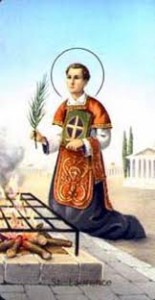 Today is the feast of St. Lawrence of Rome, one of the most famous deacons in Church history. With the restoration of the permanent diaconate over the past forty years, St. Lawrence has come to serve as an important model and patron saint for the thousands of men now serving the Church as deacons.
Today is the feast of St. Lawrence of Rome, one of the most famous deacons in Church history. With the restoration of the permanent diaconate over the past forty years, St. Lawrence has come to serve as an important model and patron saint for the thousands of men now serving the Church as deacons.
Butler’s Lives of the Saints tells a beautiful story about Saint Lawrence that captures the essence of what it truly means to be a deacon. In the year 258, Lawrence was serving Pope Sixtus II as a deacon in Rome. The Holy Father was led out to martyrdom, and St. Lawrence stood by, weeping that he could not share his fate. “I was your minister,” he said, “when you consecrated the blood of Our Lord; why do you leave me behind now that you are about to shed your own?”
The holy Pope comforted him with the words, “Do not weep, my son; in three days you will follow me.” This prophecy came true.
The political ruler of the city knew the rich offerings which the Christians put into the hands of the clergy, and he demanded the treasures of the Roman Church from Lawrence, their guardian. The Saint promised, at the end of three days, to show him riches exceeding all the wealth of the empire, and set about collecting the poor, the infirm, and the religious who lived by the alms of the faithful. He then invited the official to “see the treasures of the Church.”
Shortly after that, on August 10, 258, St. Lawrence was burned alive as a martyr for the Christian faith.
Deacons are members of the clergy, but they are not priests. Rather, they are ordained for service (diakonia), as living icons of Christ, who came not to be served, but to serve, and to give His life as a ransom for many (Mk. 10:45).
This episode from St. Lawrence’s life exemplifies the deacon’s call to look out for the needs of the poor and needy, not out of mere duty, but because they are the treasures of the Church. May all of us learn to love and serve Christ by seeing Him in those around us who are most in need of His compassion right now.
Like this:
Like Loading...
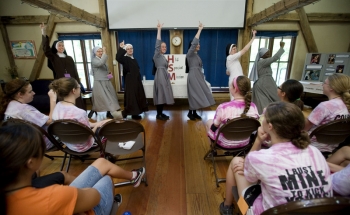 Forty girls recently participated in Camp Mater Dei, an annual two-day retreat camp for girls in sixth, seventh, and eighth grades who are discerning a religious vocation. The retreat was sponsored by the Office of Vocations for the Archdiocese of St. Louis.
Forty girls recently participated in Camp Mater Dei, an annual two-day retreat camp for girls in sixth, seventh, and eighth grades who are discerning a religious vocation. The retreat was sponsored by the Office of Vocations for the Archdiocese of St. Louis. Today is the feast of
Today is the feast of 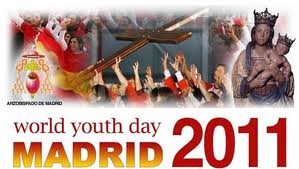 In case you haven’t heard it already, check out “Firmes en la fe” (“
In case you haven’t heard it already, check out “Firmes en la fe” (“ It’s hard to believe that it’s now been thirty years since Mother Angelica started Eternal Word Television Network (
It’s hard to believe that it’s now been thirty years since Mother Angelica started Eternal Word Television Network ( Check out
Check out  As time permits, Dom Mark Daniel Kirby is translating into English some of the writings of Mother Mectilde du Saint-Sacrement (1614-98), the foundress of the Benedictines of the Perpetual Adoration of the Most Holy Sacrament.
As time permits, Dom Mark Daniel Kirby is translating into English some of the writings of Mother Mectilde du Saint-Sacrement (1614-98), the foundress of the Benedictines of the Perpetual Adoration of the Most Holy Sacrament.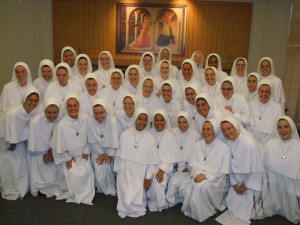 This has been a banner week for the
This has been a banner week for the  I recently came across an engaging article at Catholic Lane entitled “
I recently came across an engaging article at Catholic Lane entitled “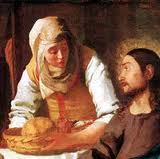 As Catholics, we try to balance in our lives of faith the active Martha and the contemplative Mary. Sometimes in the process Martha gets a bad rap. She’s anxious and worried about many things (Luke 10:41), so at times we might picture her as a frantic busybody flitting about, doing 101 things, while the serene Mary sits at the feet of Jesus.
As Catholics, we try to balance in our lives of faith the active Martha and the contemplative Mary. Sometimes in the process Martha gets a bad rap. She’s anxious and worried about many things (Luke 10:41), so at times we might picture her as a frantic busybody flitting about, doing 101 things, while the serene Mary sits at the feet of Jesus.